How They Voted. Illinois Congressional Votes
May 20, 2016UNITED STATES SENATE
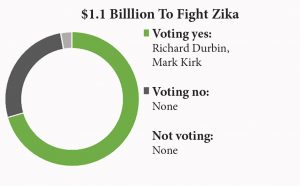 $1.1 Billlion To Fight Zika: Voting 68 for and 30 against, the Senate on May 19 included $1.1 billion in HR 2577 (above) for steps against the Zika virus such as developing a vaccine and diagnostic tests, improving pre-natal care and eradicating insect breeding grounds. The mosquito-borne virus is associated with birth defects such as babies born with unusually small heads. The National Institutes of Health and the Centers for Disease Control and Prevention asked Congress for $1.9 billion to combat the virus as it takes hold in the U.S. The $1.1 billion would be added to the deficit.
$1.1 Billlion To Fight Zika: Voting 68 for and 30 against, the Senate on May 19 included $1.1 billion in HR 2577 (above) for steps against the Zika virus such as developing a vaccine and diagnostic tests, improving pre-natal care and eradicating insect breeding grounds. The mosquito-borne virus is associated with birth defects such as babies born with unusually small heads. The National Institutes of Health and the Centers for Disease Control and Prevention asked Congress for $1.9 billion to combat the virus as it takes hold in the U.S. The $1.1 billion would be added to the deficit.
Susan Collins, R-Maine, said Zika is “linked for certain to a severe kind of birth defect” and “a disease known as Guillain-Barre syndrome, which can cause paralysis and even death….We have to act. We have to act quickly.”
John Cornyn, R-Texas, voted against the bill, but said in debate that “Zika is a threat, particularly to women of childbearing age because of the horrific birth defects associated with it, most prominently microcephaly….”
A yes vote was to approve $1.1 billion in Zika funding.
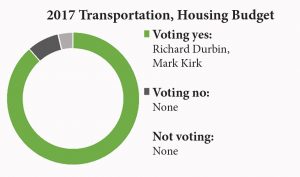 2017 Transportation, Housing Budget: Voting 89 for and 8 against, the Senate on May 19 passed a bill (HR 2577) that would appropriate $56.5 billion in fiscal 2017 discretionary spending for the departments of Transportation and Housing and Urban Development and related agencies. The bill would fund initiatives such as airport improvements, air-traffic control, maritime programs, highway safety, mass transit, Amtrak, public and elderly housing and Community Development Block Grants to cities. Separately, the bill releases $44 billion from the Highway Trust Fund for road and bridge repairs and new construction in the fiscal year that begins Oct. 1.
2017 Transportation, Housing Budget: Voting 89 for and 8 against, the Senate on May 19 passed a bill (HR 2577) that would appropriate $56.5 billion in fiscal 2017 discretionary spending for the departments of Transportation and Housing and Urban Development and related agencies. The bill would fund initiatives such as airport improvements, air-traffic control, maritime programs, highway safety, mass transit, Amtrak, public and elderly housing and Community Development Block Grants to cities. Separately, the bill releases $44 billion from the Highway Trust Fund for road and bridge repairs and new construction in the fiscal year that begins Oct. 1.
A yes vote was to pass the bill.
UNITED STATES HOUSE OF REPRESENTATIVES
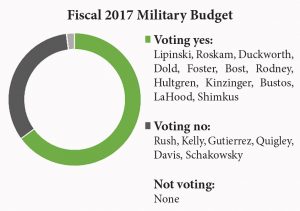 Fiscal 2017 Military Budget: Voting 277 for and 147 against, the House on May 18 authorized a $610 billion military budget (HR 4909) for fiscal 2017, including at least $40 billion for combat operations abroad; $50 billion-plus for active-duty and retiree health care; $6.7 billion for an upgraded U.S. Cyber Command; $600 million to boost Israel’s missile defenses and $150 million in military aid to Ukraine. The bill sets a 2.1 percent pay raise for uniformed personnel; bars closure of the Guantanamo Bay, Cuba, military prison; authorizes 1,541,000 active-duty, guard and reserve personnel and requires at least 9,800 American troops to be based in Afghanistan. In addition, the bill would negate President Obama’s executive order prohibiting firms receiving federal contracts from discriminating against employees on the basis of their sexual orientation or gender identity.
Fiscal 2017 Military Budget: Voting 277 for and 147 against, the House on May 18 authorized a $610 billion military budget (HR 4909) for fiscal 2017, including at least $40 billion for combat operations abroad; $50 billion-plus for active-duty and retiree health care; $6.7 billion for an upgraded U.S. Cyber Command; $600 million to boost Israel’s missile defenses and $150 million in military aid to Ukraine. The bill sets a 2.1 percent pay raise for uniformed personnel; bars closure of the Guantanamo Bay, Cuba, military prison; authorizes 1,541,000 active-duty, guard and reserve personnel and requires at least 9,800 American troops to be based in Afghanistan. In addition, the bill would negate President Obama’s executive order prohibiting firms receiving federal contracts from discriminating against employees on the basis of their sexual orientation or gender identity.
Majority Leader Kevin McCarthy, R-Calif., said the bill prioritizes funding “to support more troops, better defenses and better equipment. Most importantly, this bill works to improve readiness and ensures that our men and women are prepared to go into battle.”
Earl Blumenauer, D-Ore., questioned the bill’s large budget for nuclear weaponry, saying “this vast nuclear triad…does not help us” fight international terrorism and has “the potential of nuclear weapons falling into rogue hands….”
A yes vote was to pass the bill.
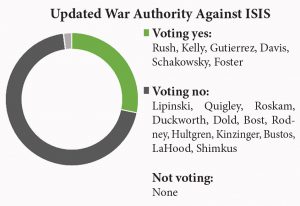 Updated War Authority Against ISIS: Voting 138 for and 285 against, the House on May 18 defeated an amendment to HR 4909 (above) that sought to revoke the 2001 Authorization for Use of Military Force (AUMF) as the legal authority for U.S. military actions against the Islamic State in Iraq and Syria (ISIS) so that it could be replaced with an up-to-date war authorization.
Updated War Authority Against ISIS: Voting 138 for and 285 against, the House on May 18 defeated an amendment to HR 4909 (above) that sought to revoke the 2001 Authorization for Use of Military Force (AUMF) as the legal authority for U.S. military actions against the Islamic State in Iraq and Syria (ISIS) so that it could be replaced with an up-to-date war authorization.
Keith Ellison, D-Minn., said congressional reliance on the 15-year-old AUMF “allows us to criticize anything the president does and yet, at the same time, never take responsibility” for U.S. operations overseas.
Ed Royce, R-Calif., said: “We must understand that a new AUMF cannot give President Obama any more authority to fight ISIS than he currently claims. It could give him less.”
A yes vote was to update U.S. authority to wage war against the Islamic State.
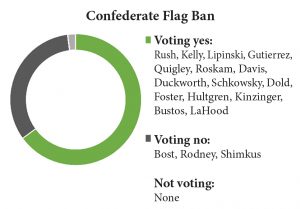 Ban On Confederate Flag: Voting 181 for and 243 against, the House on May 18 defeated a bid by Democrats to prohibit federal funding of Reserve Officers’ Training Corps (ROTC) programs at any institution displaying the Confederate battle flag. The only such institution mentioned in debate was The Citadel, a public military college in Charleston, S.C., which has displayed a Confederate flag in its Summerall Chapel since 1939.
Ban On Confederate Flag: Voting 181 for and 243 against, the House on May 18 defeated a bid by Democrats to prohibit federal funding of Reserve Officers’ Training Corps (ROTC) programs at any institution displaying the Confederate battle flag. The only such institution mentioned in debate was The Citadel, a public military college in Charleston, S.C., which has displayed a Confederate flag in its Summerall Chapel since 1939.
James Clyburn, D-S.C., said: “This objectionable banner…is a symbol of hate, racial oppression, resistance to the rule of law and white supremacy.”
No opponent commented on the motion.
A yes vote was in opposition to displays of the Confederate flag at ROTC institutions.
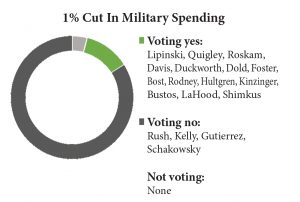 1% Cut In Military Spending: Voting 63 for and 360 against, the House on May 18 refused to cut the base amount of the 2017 military budget (HR 4909, above) by 1 percent or about $5.5 billion. The proposed cut would not affect the bill’s budget for combat operations or certain other accounts.
1% Cut In Military Spending: Voting 63 for and 360 against, the House on May 18 refused to cut the base amount of the 2017 military budget (HR 4909, above) by 1 percent or about $5.5 billion. The proposed cut would not affect the bill’s budget for combat operations or certain other accounts.
Sponsor Jared Polis, D-Colo., said if $5.5 billion in cuts were made to the U.S. nuclear arsenal, it still would be “enough to destroy the entire world and wipe out life as we know it three times instead of six times. How much is enough?”
Mac Thornberry, R-Texas, said the amendment would cut spending “below the president’s request, below last year’s funding, and below what the last (joint chiefs) chairman…said was the lower, ragged edge of what it takes to defend this country.”
A yes vote was to cut the military budget by 1 percent.
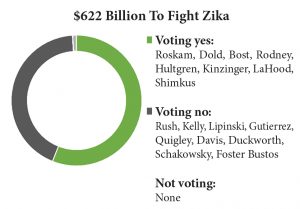 $622 Billion To Fight Zika: Voting 241 for and 184 against, the House on May 18 passed a bill (HR 5243) that would appropriate $622.1 million for programs to deal with the Zika virus as it migrates from South America and the Caribbean to the United States. The mosquito-borne virus causes birth defects. This bill is deficit-neutral because its funds are offset by transfers from other health accounts, including one for countering Ebola. A competing Senate measure (below) that would appropriate $1.1 billion in deficit spending, which is how Congress historically has financed emergency responses to public health crises and natural disasters.
$622 Billion To Fight Zika: Voting 241 for and 184 against, the House on May 18 passed a bill (HR 5243) that would appropriate $622.1 million for programs to deal with the Zika virus as it migrates from South America and the Caribbean to the United States. The mosquito-borne virus causes birth defects. This bill is deficit-neutral because its funds are offset by transfers from other health accounts, including one for countering Ebola. A competing Senate measure (below) that would appropriate $1.1 billion in deficit spending, which is how Congress historically has financed emergency responses to public health crises and natural disasters.
Harold Rogers, R-Ky., said: “We have taken the fiscally responsible step of offsetting every dollar spent in this bill” while imposing “strong oversight requirements” on how funds are spent.
Barbara Lee, D-Calif., said: “Not only does this bill underfund our Zika response, it raids vital funding for other dangerous infectious diseases, such as Ebola.”
A yes vote was to pass the bill.
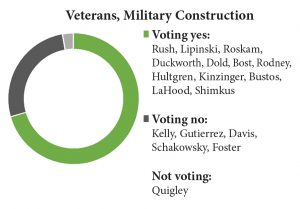 Veterans, Military Construction: Voting 295 for and 129 against, the House on May 19 sent the Senate a bill (HR 4974) that would appropriate $73.5 billion in fiscal 2017 discretionary spending for the Department of Veterans Affairs. The bill also would appropriate about $8.1 billion for building or repairing family housing, schools, medical units and other facilities at U.S. military bases worldwide. Additionally, the bill provides $102.6 billion in mandatory veterans spending for programs such as disability compensation, pensions and the post-9/11 GI Bill. The bill also appropriates several hundred million dollars to operate Arlington National Cemetery, the Armed Forces Retirement Home, the American Battle Monuments Commission and the U.S. Court of Appeals for Veterans Claims.
Veterans, Military Construction: Voting 295 for and 129 against, the House on May 19 sent the Senate a bill (HR 4974) that would appropriate $73.5 billion in fiscal 2017 discretionary spending for the Department of Veterans Affairs. The bill also would appropriate about $8.1 billion for building or repairing family housing, schools, medical units and other facilities at U.S. military bases worldwide. Additionally, the bill provides $102.6 billion in mandatory veterans spending for programs such as disability compensation, pensions and the post-9/11 GI Bill. The bill also appropriates several hundred million dollars to operate Arlington National Cemetery, the Armed Forces Retirement Home, the American Battle Monuments Commission and the U.S. Court of Appeals for Veterans Claims.
A yes vote was to pass the bill.
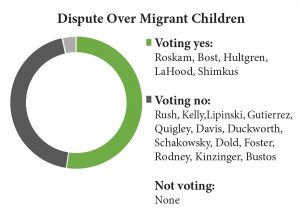 Dispute Over Migrant Children: The House on May 19 voted, 219 for and 202 against, to prohibit the use of funds in HR 4974 (above) for housing unaccompanied migrant children at U.S. military bases while their immigration status is under review. This would blunt a tentative administration plan to use excess space at several bases for temporarily housing children who crossed the U.S.-Mexico border illegally without adult companions.
Dispute Over Migrant Children: The House on May 19 voted, 219 for and 202 against, to prohibit the use of funds in HR 4974 (above) for housing unaccompanied migrant children at U.S. military bases while their immigration status is under review. This would blunt a tentative administration plan to use excess space at several bases for temporarily housing children who crossed the U.S.-Mexico border illegally without adult companions.
John Fleming, R-La., said: “The use of (military) facilities to house unaccompanied alien children undermines the readiness of our Armed Forces, which we know to be `in extremis’ at this point.”
Sanford Bishop, D-Ga., said the amendment “is not what the United States stands for….It is not consistent with our country’s Christian values.”
A yes vote was to adopt the amendment.
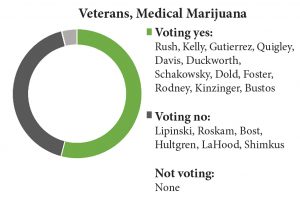 Veterans, Medical Marijuana: The House on May 19 voted, 233 for and 189 against, to allow the Veterans Health Administration to counsel patients on using medical marijuana for ailments such as chronic pain and post-traumatic stress disorder (PTSD). With marijuana illegal under federal law, the VHA is prohibited from prescribing it or counseling veterans on its medicinal benefits. The vote occurred during debate on HR 4974 (above). Twenty-three states and the District of Columbia have legalized medical marijuana and at least nine allow it to be prescribed for treating PTSD.
Veterans, Medical Marijuana: The House on May 19 voted, 233 for and 189 against, to allow the Veterans Health Administration to counsel patients on using medical marijuana for ailments such as chronic pain and post-traumatic stress disorder (PTSD). With marijuana illegal under federal law, the VHA is prohibited from prescribing it or counseling veterans on its medicinal benefits. The vote occurred during debate on HR 4974 (above). Twenty-three states and the District of Columbia have legalized medical marijuana and at least nine allow it to be prescribed for treating PTSD.
Earl Blumenauer, D-Ore., said “overwhelming” numbers of veterans “say medical marijuana has helped them deal with PTSD, pain and other conditions, particularly as an alternative to opioids, and I would argue that it is essential that (they) be allowed access to this as a treatment if it is legal in their state.”
Charlie Dent, R-Pa., said he is “a bit uncomfortable…in trying to dictate policy on marijuana without guidance from the Food and Drug Administration, National Institutes of Health and other medical professionals.”
A yes vote was to adopt the amendment.
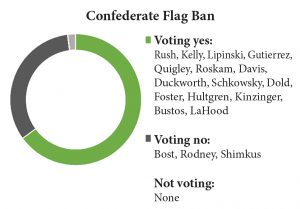 Confederate Flag Ban: Voting 265 for and 159 against, the House on May 19 adopted an amendment to HR 4974 (above) that would prohibit the display of Confederate flags on flagpoles at national cemeteries while allowing small Confederate flags to be displayed at individual gravesites.
Confederate Flag Ban: Voting 265 for and 159 against, the House on May 19 adopted an amendment to HR 4974 (above) that would prohibit the display of Confederate flags on flagpoles at national cemeteries while allowing small Confederate flags to be displayed at individual gravesites.
Jared Huffman, D-Calif., said: “Symbols like the Confederate battle flag have meaning. They are not just neutral, historical symbols of pride. They represent slavery, oppression, lynching and hate.”
No member spoke against the amendment.
A yes vote was to adopt the amendment.
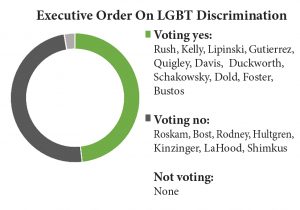 Executive Order On LGBT Discrimination: Voting 212 for and 213 against, the House on May 19 refused to uphold an executive order by President Obama that prohibits companies receiving federal contracts from discriminating against employees based on the fact that they are lesbian, gay, bisexual or transgender (LGBT). Proposed to HR 4974 (above), this amendment sought to negate Republican-sponsored language in the House version of the 2017 military budget that would repeal the anti-discrimination order.
Executive Order On LGBT Discrimination: Voting 212 for and 213 against, the House on May 19 refused to uphold an executive order by President Obama that prohibits companies receiving federal contracts from discriminating against employees based on the fact that they are lesbian, gay, bisexual or transgender (LGBT). Proposed to HR 4974 (above), this amendment sought to negate Republican-sponsored language in the House version of the 2017 military budget that would repeal the anti-discrimination order.
Sean Patrick Maloney, D-N.Y., said nixing the executive order “is about bigotry, plain and simple.”
Pete Sessions, R-Texas, said: “I am a Republican. We do not discriminate. We attempt to follow the law….”
A yes vote was to affirm the president’s order on LGBT discrimination by federal contractors.
— How They Voted. Illinois Congressional Votes —



